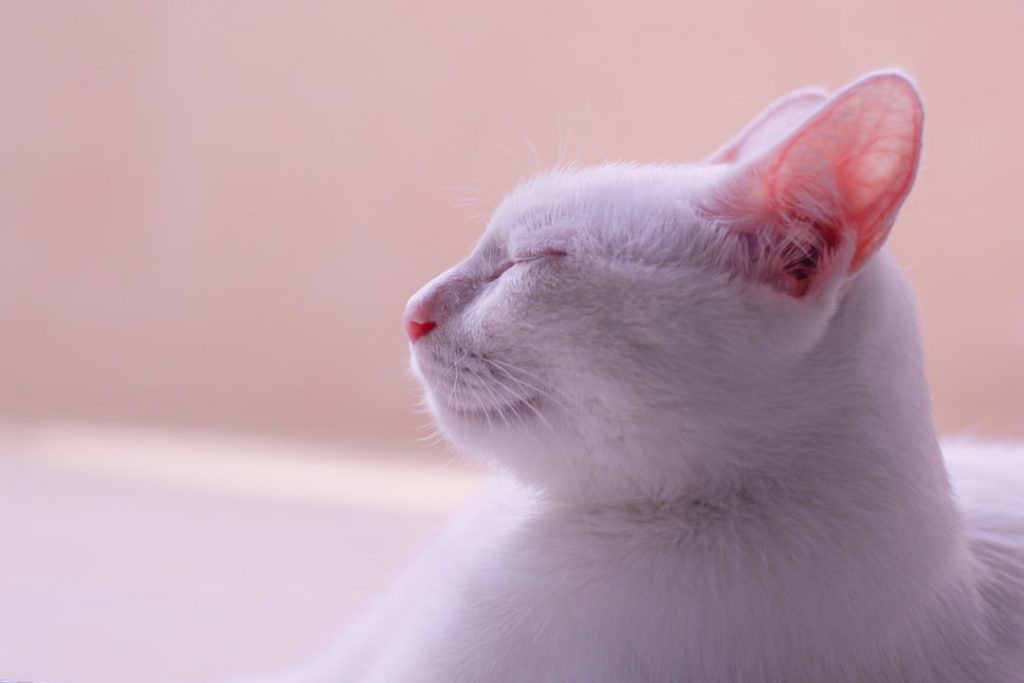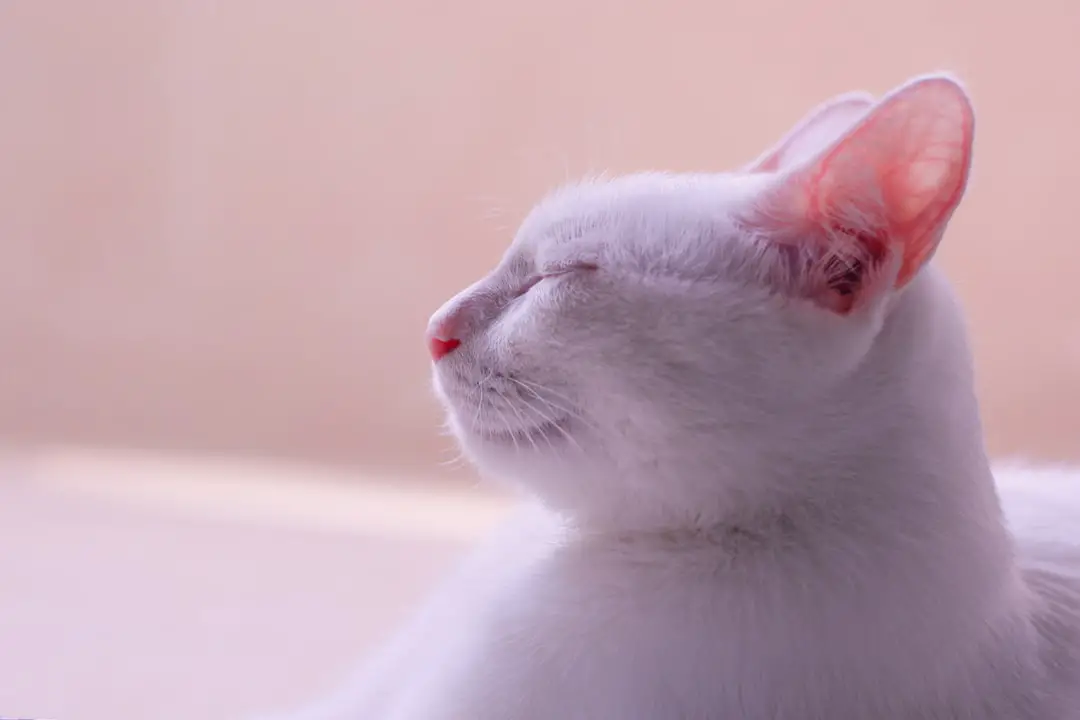Did you know that cats communicate with their ears? Notice how the positions of the flaps change as your cat’s mood shifts throughout the day. The thirty-two tiny muscles in a cat’s expressive ears are capable of communicating 180-degrees worth of emotional nuance with a single flick! Keep reading to learn about “Why Are my Cat’s Ears hot?”
As it turns out, our cat’s ears can tell us a lot more than details about our best friend’s mood!
Have you ever been giving your kitty scritches only to notice that those sweet little ears feel warmer than usual? In cats, body temperature is a subtle form of communication, too. So, you might be wondering “why are my cat’s ears hot, and what should I do about it?”
A change in a cat’s body temperature might be a subtle signal that something is wrong with your furry friend. We’ve created this guide to help explain some of the possible reasons why your feline’s ears are warmer than usual. Keep reading so you can make sure you’re getting your fluffy friend the care they need to keep making those biscuits!

Contents
So, Why Are My Cat’s Ears Hot?
Your cat probably has no reservations about yowling in the middle of the night or meowing incessantly when you’re late at feeding time. They tend to be less forthcoming about communicating medical needs, however. An attentive pet owner will learn to notice the small signs and symptoms of a problem, but even an observant cat lover might miss these subtle cues.
This is funny because cats have such an acute sense of smell that they almost always know when their humans are under the weather! If you’ve noticed your reticent cat coming to snuggle when you’re not feeling well, this is why! Even so, cats have a tendency to try and hide their own illnesses, which can make it a lot more difficult to detect a problem.
After all, your sweet little house cat is still a predator. They understand predatory behavior and know that any weakness can make them a target for larger predators. If they reveal that they are sick or injured, they’re essentially making themselves easy targets.
This doesn’t mean that your cat doesn’t want help! They’re acting on instincts and cannot change their behavior.
Often, the first symptom that a pet owner will notice is cat ear temperature. We spend so much time petting our cats throughout the day that aberrations tend to stand out. Their thin little ears are far more likely to be cold than warm, so when that changes, you’ll take notice.
Sometimes a change in body temperature is the first sign of a medical problem that will require vetting. Unfortunately, feline behavior means owners will not notice a real problem until it has become an emergency. You should always bring your cat to the vet for regular checkups so you don’t miss problems that they may be trying to hide.
Hot cat ears are not always a sign of injury or illness, however! There is a range of reasons why the ear temperature of cats might fluctuate, and some are quite benign!
Cats Are Heat-Seeking
What is your cat’s favorite spot in the house? Often it’s exactly where you were just sitting! This is because cats love a warm, cozy spot, and they will happily absorb the body heat that you left behind!
In the middle of the day, however, cats seem to gravitate toward beams of sunlight like fuzzy little magnets. If you set up a heater or warming mat, odds are good that your kitty will find it before other humans can! For a feline, a warm fire is like an invitation to curl up in toasty bliss!
This is because cats have a lower sensitivity to heat and a warmer overall body temperature than their humans. The majority of their heat sensors are on and around their faces. This includes their highly sensitive ears!
Thus, the answer to “why do cats get hot ears?” might just be that they were recently sunbathing! High temperatures don’t harm cats, so they can tolerate a fair bit of warmth before they overheat. If their ears cool down fairly quickly, it’s safe to assume that they were just enjoying a sauna of their own design!
Hot Ears Can Be a Sign of Fever
If your cat’s ears are warm and they don’t cool down after time away from a heat source, there is a chance that your cat has a fever. You will want to pay attention to your cat’s other behaviors before you can know for sure. For example, is your normally social cat hiding or avoiding interaction during the day?
Another way to determine if your cat might have a fever is to take note of their other body parts and see if anything seems out of the ordinary. Cats sweat through their paw pads. If their paws also feel unusually warm to the touch, this can be a major clue that your cat is feverish.
Next, you might want to take note of your cat’s nose. A healthy cat will have a nose that is moist and cool to the touch. If your cat’s nose seems dry or unusually warm, this is a clear sign that they might not be feeling well.
The only way to confirm that your cat has a fever is to use a thermometer, either at home or at a veterinary office. Because a cat has a naturally high body temperature, you should be looking for a reading above 103.6 degrees Fahrenheit. If you detect a fever at home, bring your cat to the vet as soon as possible for further tests or instructions.
Cats Have Allergies, Too
If your cat is fever-free, you might still be wondering “What do hot cat ears mean?” Occasionally, warm ears can be a sign of an allergic reaction. Cats have sensitive immune systems like humans do, and allergic responses can manifest in many ways.
The most common allergies in cats are environmental allergies, food allergies, season allergies, and flea allergies. Some of these allergies can cause or manifest in the form of ear infections. If you notice redness in addition to heat, there is a good chance that your cat may be experiencing an allergic reaction to something.
Because there are so many different potential allergies, you will need to bring your cat to a vet to confirm the cause of the reaction. The vet will perform either a blood test or a skin test to try to identify the irritant.
If the vet finds that your cat has allergies, they will prescribe a treatment or suggest a solution. This will depend on the nature of the allergy. Your vet may prescribe your cat an antihistamine medication or may suggest that you change your cat’s litter or diet.
Feline Diseases Affecting the Ears
If you have ruled out fever, allergies, and infections, your cat may be suffering from an ear disease. The most common ear disease in cats is otitis externa. This refers to an infection of the outer ear canal and is sometimes shortened to Otitis.
A small parasite called an ear mite is the most likely cause of this disease. These tiny, spider-like insects thrive inside of a cat’s ears. If your cat has ear mites, you will probably notice dark, thick discharge inside of your pet’s ears.
Symptoms of Otitis include excessive earwax, tissue damage, and, eventually, deafness. Your cat is more likely to lose his or her hearing if the infection migrates to the inner ear. A deaf cat might struggle with balance and equilibrium, which can have a major impact on your pet’s quality of life.
A simple veterinary checkup will reveal whether your cat might have signs of an ear mite infection or otitis. If this is the case, the cause of your cat’s hot ears is probably their swollen or blocked ear canal.
You must bring your cat to the vet at the very first sign of a problem. Otitis will occasionally seem to clear up on its own, but, like other infections, tends to come back with a vengeance.
Typically, the treatment is a course of antibiotics. This is simple and painless and will provide a lot of relief for your cat! In severe cases, some cats do require expensive surgical interventions, so definitely don’t put off that veterinary checkup!
Learning to Listen to Quiet Communication
Life would be a lot easier if our pets could come to us and let us know exactly what’s wrong! Unfortunately, a cat has strong instincts and will tend to do the exact opposite when they’re having a problem.
In essence, if you’re wondering, “Why are my cat’s ears hot?” and they’re not sitting near the window or radiator, you should make an appointment with your vet.
Are you looking for more posts that can help you keep your favorite pets happy and healthy? The Animal Fate blog contains many more informative posts about all things feline! Check out our other posts about cat health, behavior, and more.



